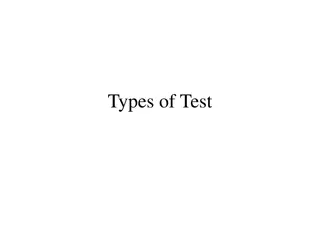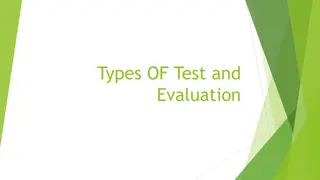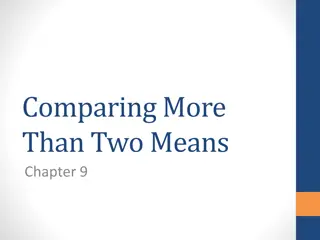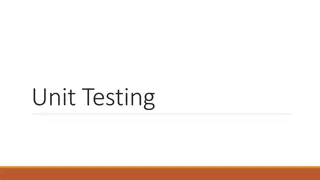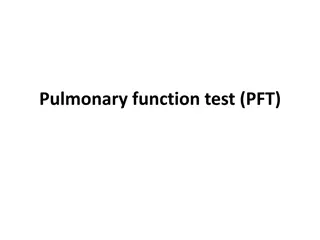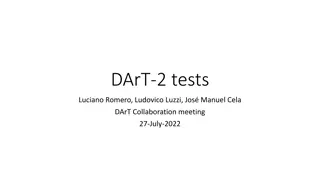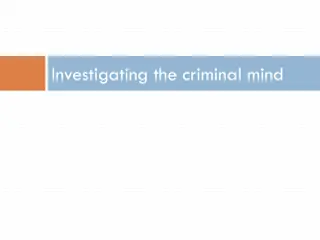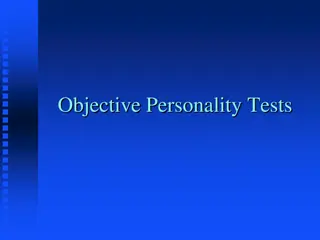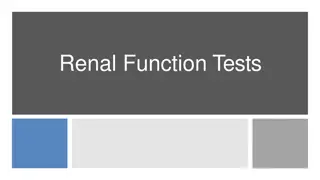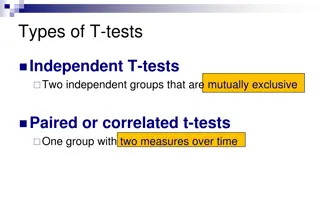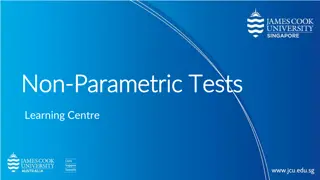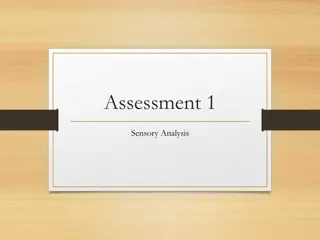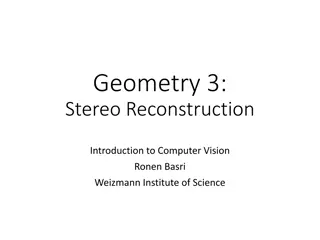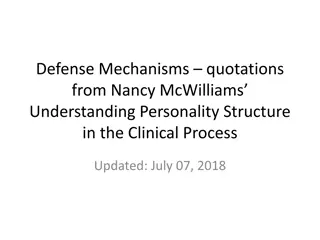Understanding the Differences Between Objective and Projective Tests
Objective tests aim to maximize objectivity by providing structured response options, while projective tests delve into hidden emotions and conflicts through ambiguous stimuli. Pros of objective tests include standardization and reliability, but projective tests offer unique insights based on individual responses. Cons of objective tests include their use in mental disorder screening and work assessments, while projective tests are favored by some clinicians for their depth of analysis.
Download Presentation

Please find below an Image/Link to download the presentation.
The content on the website is provided AS IS for your information and personal use only. It may not be sold, licensed, or shared on other websites without obtaining consent from the author. Download presentation by click this link. If you encounter any issues during the download, it is possible that the publisher has removed the file from their server.
E N D
Presentation Transcript
OBJECTIVE VS. PROJECTIVE TEST ASSOCIATE PROFESSOR SAIMA MAQBOOL.
OBJECTIVES Objective test Projective test Objective vs. projective test Pros and cons objective test Pros and cons of projective test
OBJECTIVE TEST Objective tests are measures in which responses maximize objectivity, in the sense that response options are structured such that examinees have only a limited set of options (e.g. Likert scale, true or false).[1]Structuring a measure in this way is intended to minimize subjectivity or bias on the part of the individual administering the measure so that administering and interpreting the results does not rely on the judgment of the examiner. objective test encompasses a wide range of tests with which most people are somewhat familiar (i.e. Wechsler Adult Intelligence Scale, Minnesota Multiphasic Personality Inventory, Graduate Record Examination, and the Standardized Achievement Test),
PROJECTIVE TEST In psychology, a projective test is a personality test designed to let a person respond to ambiguous stimuli, presumably revealing hidden emotions and internal conflicts projected by the person into the test. This is sometimes contrasted with a so-called "objective test" / "self- report test", which adopt a "structured" approach as responses are analyzed according to a presumed universal standard (for example, a multiple choice exam), and are limited to the content of the test. The responses to projective tests are content analyzed for meaning rather than being based on presuppositions about meaning, as is the case with objective tests. Projective tests have their origins in psychoanalysis, which argues that humans have conscious and unconscious attitudes and motivations that are beyond or hidden from conscious awareness. Examples include holtzman inkblot test and thematic apperception test.
PROS AND CONS OF OBJECTIVE TESTS PROS One of the main advantages that objective tests have over projective tests is standardization. The most popular objective personality tests have been extensively tested and have well-established norms, so it's possible to interpret people's scores statistically in comparison to the general population. Most importantly, objective personality tests are fairly reliable and have overall higher validity than projective tests. A valid test of extroversion would produce scores that have positive associations with social behavior.
PROS AND CONS OF OBJECTIVE TEST CONS. Many objective tests have been created to screen for mental disorders, MMPI being the most significant example, but companies use them now to asses people for work purposes. Many clinicians like projective tests as they are less restrictive and more subtle, especially when interpreted individually and not "scored" in the manner of objective tests. Easy to fake.
PROS AND CONS OF PROJECTIVE TEST PROS If the tests are unstructured it is easy for the respondents to declare their personality It is assumed that the projection is greater than the stimulus which is almost same as the respondent Each and every response given by the respondent explains the benefits of personality Another assumption is that there is an unconscious mind in every person
PROS AND CONS OF PROJECTIVE TESTS CONS It needs highly qualified and experienced professionals It is expensive Risk of interpretation bias Respondents engage in unusual behavior. Unstructured techniques.



